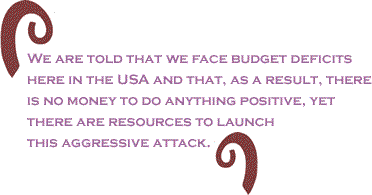I
have to admit it, and I do so publicly, that I was wrong.�
I did not believe that the USA and their European allies
were going to attack Libya.� Please do not misunderstand
me:� I was clear that the USA and its European allies were
quite capable of carrying out the attack and I was never
fooled by their professions of morality.� It is just that
I thought that they understood the potential implications,
from their own standpoint, of such an attack.
A few weeks ago, as the Libyan insurrection was under way,
Secretary of Defense Gates suggested that it would be poor
judgment for the USA to engage in another land war.� I took
this seriously, not at the level of morality, but more at
the apparent realization within the US ruling elite of the
potential financial and political costs involved in an intervention
in Libya.� Events, however, moved very quickly and in a
different direction.
Let�s leave aside the hypocrisy of the attack on Libya.�
The ruling class in Bahrain is, along with their Saudi allies,
crushing the peaceful opposition.� The Yemeni allies of
the USA are killing opponents.� Yet the West chooses to
focus on Libya.
Libya is in the midst of a civil war.� It is one that pits
a broad front of pro-democracy rebels against the irrational
tyranny of Col. Qaddafi.� The lack of coherent social movements
and the vicious repression against peaceful protesters by
Qaddafi�s regime led to a violent reaction that evolved
into a full-blown insurrection.

While it appeared that the rebels were close to winning,
they lacked organization and military training.� Qaddafi�s
forces, on the other hand, were well organized, well-equipped
and obtained mercenaries.� The rebels lost the initiative.�
Had there been a more significant split within Qaddafi�s
forces, the rebels might have rolled onto victory but things
did not play out that way.
The sabers that have been rattling around Libya by the West
have been justified as not being about regime change or
an outright invasion, but in order to enforce a cease fire.�
But this is a civil war.� Leave aside the tyranny of Qaddafi,
the bottom line is that this is a matter that the Libyan
people must themselves address.� While there is people-to-people
support that can be offered to those fighting for democracy,
the moment that governments get involved, things change,
and often change quite dramatically, particularly when those
governments are from the West.
I had an argument the other night with a good friend who
was telling me that a US-led intervention was important
to prevent Qaddafi from murdering thousands. My question
to my friend is this:� when has the US led an intervention,
since World War II, that has actually addressed a humanitarian
disaster and left the country independent and stronger than
before they arrived?� I know of no such examples and neither
did my friend.� If there was a genocide being prepared,
along the lines of Rwanda 1994, I would still argue that
the USA should not intervene unilaterally, but should be
in support of an internationally recognized force.
Which, come to think about it, actually raises a few questions.�
The Arab League voted in favor of a no-fly zone but now
says that they are against the attacks.� This feels like
a distinction without a difference.� You cannot tell me
that they passed a resolution in favor of a no-fly zone
without thinking through the ramifications, particularly
when the US and its European allies were making noises about
military action.

Additionally, what about the African Union?� Ironically,
Libya was one of the principal founders of the African Union.�
Why was this matter not handled by the African Union?� How
did this fall to Obama to resolve?
It is far from certain where this intervention will end.�
Libya could find itself divided into an eastern and western
zone.� The rebels could go on the offensive.� This could
end up being a drawn out conflict.� So, how long will the
USA and its European allies remain involved?� And toward
what end.
We are told that we face budget deficits here in the USA
and that, as a result, there is no money to do anything
positive, yet there are resources to launch this aggressive
attack.� While the Obama administration may believe that
this is a short-term venture, the facts on the ground may
prove this to have been a major miscalculation.� So, how
does yet another war get funded?
We have witnessed an Arab democratic uprising spread WITHOUT
the support of outside forces.� And now the USA and its
allies enter the fray potentially destabilizing the situation,
including giving opportunists in North Africa and the Middle
East (such as Iran�s President Ahmadinejad) a credible (but
false) argument that the revolts are actually the work of
the West.
How foolish.� How arrogant.
BlackCommentator.com Editorial Board member, Bill Fletcher, Jr., is a Senior Scholar with
the Institute for
Policy Studies, the immediate past president ofTransAfrica Forum and co-author of Solidarity Divided: The Crisis in
Organized Labor and a New Path toward Social Justice(University of California Press), which examines the crisis of organized
labor in the USA. Click here to contact Mr. Fletcher.
|

